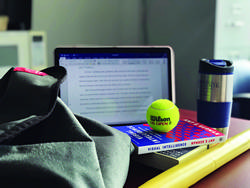As college students, sometimes we have to juggle several things at once while still taking a full course load, student athletes have an extra ball that they have to juggle.
Student-athletes have to manage class around a tough workout and game schedule. Student-athletes have to sometimes miss classes while traveling across the country for a game.
Time management for a student-athlete is an important part of balancing school and athletics in their daily lives. “The biggest challenge during the season is definitely time management,” said Amanda Knaub, a sophomore criminal justice student and women’s soccer goalie. “Being able to balance five and maybe even six classes with practice every day and games twice a week is difficult but it teaches us how to manage our time wisely,” she said.
“Think of how tired a student who isn’t an athlete gets because they had to stay up late to study, etc,” said McKinzee Barker, a junior biology student and women’s basketball guard. “Then add that to having to get up early for practice, go straight from practice to class, sometimes not having time to shower and eat, while needing to be mentally focused to learn whatever is being taught during the lecture. It’s insanely difficult but I’m thankful for it,” she said.
“It really comes to time management and forming a day to day routine,” Thomas Bieber, Associate Athletics Director for Academic Support, said.
“Part of what we require among our freshmen student athlete population is mandatory study hall, which consists of a minimum number of hours spent at the library, time spent with tutors, with professors during office hours, etc. each week. This requires freshmen [student athletes] to manage time for studying and academics, just like they need to manage the time to practice, travel, and compete,” he continued.
Study hall hours are at the discretion of the athletics academic support staff and the Head Coach of each team. Hours can vary based on class (freshman, sophomore, etc.), academic history of student-athlete, current GPA, and other factors.
Bieber added, “Once that routine is established on a day to day basis, concepts like ‘cramming’ and ‘procrastination’ go out the window and an even flow of athletics and academics is achieved.”
Alexa Smith, a senior biochemistry student and women’s lacrosse midfielder, said Academic Support always had her best interest in mind. “Although I liked to formulate my schedule on my own to ensure it would work best for me they have always answered any questions I had,”
Student-athletes play regularly through the week and have scheduled practices daily. Sometimes, missing class for a game is inevitable. But at Monmouth, student athletes are able to get help from their professors so they don’t fall behind.
“The professors are very helpful though and make sure to work with me and make sure I can make up whatever I miss,” Barker said.
“Professors have truly moved mountains for me,” Smith said. “I learned quickly that if you let them know you are a hard working student and are willing to work with them there will typically not be any problems with rescheduling exams or just seeking out extra time to come in and go over new topics.”
Student-athletes also are very limited when they can take classes, as they have to arrange them around practice and game times.
“Creating a class schedule around my matches and practices is difficult with such a demanding major,” said William Cooke Wharton, a freshman biology student and men’s tennis player. “Sometimes we have two practices a day and a lift session. I am usually tired from the practice or match we had the day before, and if we have an early morning practice it can be tough to stay awake during the lectures.”
“We have certain times where we cannot take classes because it would interfere with our practice times in the morning,” Knaub said. “There are also days where I cannot take afternoon classes due to travel time for away games. This limits me to what classes I can take each semester and makes it difficult to schedule sometimes.”
“Being a student-athlete in general is definitely challenging, but going through the process as biochemistry major has made me up my bar even further,” Smith said. “I have learned to be disciplined, to have excellent time management skills and to take things in stride. I try not to become overwhelmed by completing assignments in an orderly fashion and studying for exams about a week before they occur.”
With all the work that needs be done between class and practice, being a student comes before athletics.
PHOTO TAKEN by Nicole Riddle




